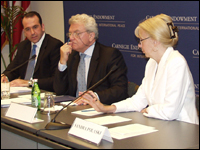Registration
You will receive an email confirming your registration.
IMGXYZ912IMGZYXOn June 24, 2008, the Carnegie Endowment hosted a discussion on EU and U.S free trade agreements (FTAs) in the Middle East with Riad al Khouri, a visiting scholar at the Carnegie Middle East Center. Al Khouri remarked that the topic of free trade is becoming important in the election campaign, but is deceptive in the context of the Middle East. Historically, the European Community has been much more active in negotiating FTAs, which it began in the 1960s with its Mediterranean neighbors. The European Union expanded this process in 1995 with the initiation of the Barcelona Process.
U.S. interest in concluding FTAs in the Middle East, on the other hand, is primarily strategic. During the 1990s, the United States sought to further the Middle East Peace Process through closer trade relations between Arab countries and Israel, and following September 11, 2001, sought to reward allies in the war on terrorism with FTAs. With the partial exception of the Qualified Industrial Zones (QIZ) in Jordan, the FTAs the United States has signed with Jordan, Morocco, Bahrain, and Oman have had a negligible economic impact. Meanwhile, the European Agadir process is showing some potential to boost Arab exports to Europe, while the Union for the Mediterranean, to be launched in the near future by French President Nicolas Sarkozy, does not look promising.
Sandra Polaski, director of the Carnegie Trade, Equity and Development Program, provided comments on al Khouri’s presentation. Polaski welcomed evaluation of FTAs based on their impact on the welfare of Middle Eastern populations, as opposed to the Washington-centric perspective that focuses on strategic and political implications in isolation. Al Khouri’s analysis also contains lessons about the U.S. policy of “competitive liberalization” in the early 2000s of encouraging potential partners to compete with one another to get an agreement with the United States. Results clearly indicate that multilateral trade negotiations are much more beneficial for developing countries.
During the question and answer session, al Khouri and Polaski addressed issues including the rules, benefits, and reasons for the failure of QIZs, record of competitive liberalization, influence of Israel in FTA negotiations, and differences between North Africa and the Middle East. Sufyan Alissa, advisor to the executive director of the World Bank, moderated the event.
